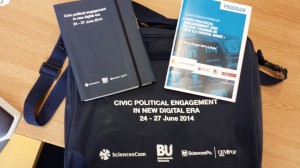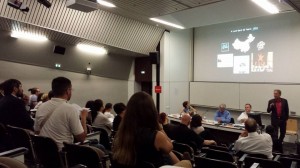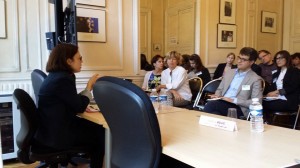 The grand international conferences attracting up to 1,000 academics are highly prestigious, however the opportunities to find academics in a field, talk in-depth about approaches, concepts, methodologies, data and future ideas is constrained by the size and scale. Hence BU collaborated with Science-Po (Paris) and Sciencecomm (Audencia Nantes) to bring together scholars whose work has a specific focus on online political engagement in order to explore current thinking and investigate avenues for collaboration. The event #CPE2014 (http://www.cpe2014.com/) attracted 34 participants; some very established some just starting out in a research career, some invited some who submitted abstracts speculatively following the call. What connected the works was the objective of conceptually and empirically determining what engagement and participation means in the age of ubiquitous digital media.
The grand international conferences attracting up to 1,000 academics are highly prestigious, however the opportunities to find academics in a field, talk in-depth about approaches, concepts, methodologies, data and future ideas is constrained by the size and scale. Hence BU collaborated with Science-Po (Paris) and Sciencecomm (Audencia Nantes) to bring together scholars whose work has a specific focus on online political engagement in order to explore current thinking and investigate avenues for collaboration. The event #CPE2014 (http://www.cpe2014.com/) attracted 34 participants; some very established some just starting out in a research career, some invited some who submitted abstracts speculatively following the call. What connected the works was the objective of conceptually and empirically determining what engagement and participation means in the age of ubiquitous digital media.
 The keynotes from Rachel Gibson (Manchester, UK) and Bruce Bimber (University of California, US) set the scene conceptually asking what is really new in the digital age, and arguing technology is a context for communication and for action as opposed to a cause. Many papers thus explored to what extent we can argue something new has emerged, what might that be and what in terms of political engagement and participation does digital technology facilitate.
The keynotes from Rachel Gibson (Manchester, UK) and Bruce Bimber (University of California, US) set the scene conceptually asking what is really new in the digital age, and arguing technology is a context for communication and for action as opposed to a cause. Many papers thus explored to what extent we can argue something new has emerged, what might that be and what in terms of political engagement and participation does digital technology facilitate.
What did we learn from this? It is no real surprise to hear of the breadth and depth of the forms and types of activities that online spaces provide. We know vast numbers of organisations, corporate, political and third sector, who populate the world wide web. We also know most of these have gravitated towards social media, having a Facebook page, YouTube channel and Twitter feed seem de rigeur at the very least. And we find many affordances for Interaction (Giraldo-Luque & Duran-Becerra) as well as learning and engaging (Schneidemesser; Vasilopoulos; de Blasio & Santaniello). The biggest questions revolve around impact, are there new forms of communication, of engagement, of participation, of influence that are a by-product (wanted or unwanted) with the colonisation of the social web?
 As would be expected the answers to these questions offer mixed results, and any conclusions are tentative at best. One key theme is the notion of expressive participation, ‘having a say’ whether it be commenting or talking online (Kountouri or Bouillianne for example), acting as an online vigilante (Loveluck) or as a news gatherer (Wimmer & Schultz). The data from studies by Rachel Gibson and colleagues, Christian Vaccari and Homero Gil de Zuniga certainly provide compelling evidence to suggest expression as a pathway to deeper forms of participation. We also gain a sense of how influence can be exacted (Mossberger & Kao; Bang), though also that perhaps the social web can also be a distraction leading users away from the civic rather than more positive perspectives (Bojic). The visualization of forms of expression (Koc-Michalska, Lilleker & Wells; Vergeer, Boynton & Richardson) go some way to understanding some aspects of the nature of these expressions, though they raise issues regarding how to make sense of the big data which can be gathered from the Internet; discussions around this and the tools available was one key outcome of the workshop.
As would be expected the answers to these questions offer mixed results, and any conclusions are tentative at best. One key theme is the notion of expressive participation, ‘having a say’ whether it be commenting or talking online (Kountouri or Bouillianne for example), acting as an online vigilante (Loveluck) or as a news gatherer (Wimmer & Schultz). The data from studies by Rachel Gibson and colleagues, Christian Vaccari and Homero Gil de Zuniga certainly provide compelling evidence to suggest expression as a pathway to deeper forms of participation. We also gain a sense of how influence can be exacted (Mossberger & Kao; Bang), though also that perhaps the social web can also be a distraction leading users away from the civic rather than more positive perspectives (Bojic). The visualization of forms of expression (Koc-Michalska, Lilleker & Wells; Vergeer, Boynton & Richardson) go some way to understanding some aspects of the nature of these expressions, though they raise issues regarding how to make sense of the big data which can be gathered from the Internet; discussions around this and the tools available was one key outcome of the workshop.
The workshop also showed the importance of mixed methods. We talked of understanding the lifeworld (Lilleker), how politics links with or is seen as separate from the everyday, and whether civic, social, political are the same or each have clear boundaries both conceptually and practically (Bang). But this raised the importance of mixed methods. Vergeer took us beyond the quantitative, sociological meat grinder of the survey which boils down human factors to key indicators, yet this exposes the contradiction when in exploring big data we have to mince and mash rich text resulting from complex behavior to get to the structure (the DNA) rather than the nuances of each individual contribution. Hence the interview (Bouillianne, Neys), ethnographic work (Ozkula) and text and diary entries (Cantioch) offers fascinating insights that can build understanding on top of the numbers (Vozab; Klinger: Hooghe for example).
 The workshop therefore is part of a development in the understanding and a revisionist movement around the notions of engagement and participation and the theoretical positions which have to date been used to understand human civic and political behavior. The value of the meeting of these scholars was to identify the different strands of research, the expertise in the field, the current indications from data, the methodologies and where the research should go next. For us some will be exploring collaboration around a Horizon 2020 bid on youth as a driver of social change (YOUNGa-2014a), some further will be meeting again at the ECPR Joint workshops in Warsaw 2015 in a workshop again organized by Koc-Michalska and Lilleker, some will also likely find opportunities to share data and develop publications. A proposal for a special collection is in the pipeline gathering together the more empirically driven works. Hence this now tight-knit group may well remain close and develop as a collaborative network long into the future.
The workshop therefore is part of a development in the understanding and a revisionist movement around the notions of engagement and participation and the theoretical positions which have to date been used to understand human civic and political behavior. The value of the meeting of these scholars was to identify the different strands of research, the expertise in the field, the current indications from data, the methodologies and where the research should go next. For us some will be exploring collaboration around a Horizon 2020 bid on youth as a driver of social change (YOUNGa-2014a), some further will be meeting again at the ECPR Joint workshops in Warsaw 2015 in a workshop again organized by Koc-Michalska and Lilleker, some will also likely find opportunities to share data and develop publications. A proposal for a special collection is in the pipeline gathering together the more empirically driven works. Hence this now tight-knit group may well remain close and develop as a collaborative network long into the future.











 New CMWH paper on maternity care
New CMWH paper on maternity care From Sustainable Research to Sustainable Research Lives: Reflections from the SPROUT Network Event
From Sustainable Research to Sustainable Research Lives: Reflections from the SPROUT Network Event REF Code of Practice consultation is open!
REF Code of Practice consultation is open! ECR Funding Open Call: Research Culture & Community Grant – Apply now
ECR Funding Open Call: Research Culture & Community Grant – Apply now ECR Funding Open Call: Research Culture & Community Grant – Application Deadline Friday 12 December
ECR Funding Open Call: Research Culture & Community Grant – Application Deadline Friday 12 December MSCA Postdoctoral Fellowships 2025 Call
MSCA Postdoctoral Fellowships 2025 Call ERC Advanced Grant 2025 Webinar
ERC Advanced Grant 2025 Webinar Update on UKRO services
Update on UKRO services European research project exploring use of ‘virtual twins’ to better manage metabolic associated fatty liver disease
European research project exploring use of ‘virtual twins’ to better manage metabolic associated fatty liver disease